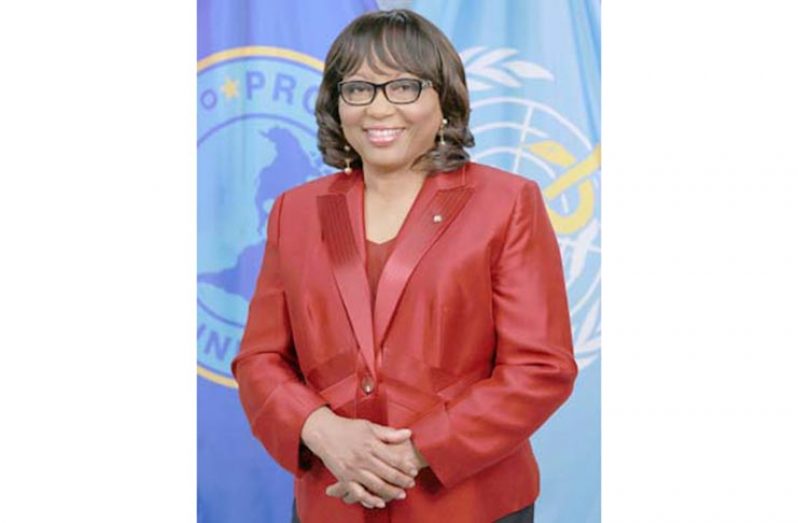… AHO director says countries must manage pandemic closely for the next 2 years
The Director of the Pan American Health Organization, Carissa F. Etienne, on Wednesday said that “in the absence of effective treatments or a widely available vaccine, we expect that over the next two years the Region of the Americas will experience recurring COVID-19 outbreaks, which may be interspersed with periods of limited transmission.”
“In the face of a fast-changing pandemic, leadership will make or break our response. Now is the time for leaders to reach across political divisions and geographic borders to rally the support for a response commensurate to this unprecedented crisis,” Etienne added during a press briefing Wednesday.
Cases of COVID-19 in the Americas have topped 4.5 million, with 226,000 deaths as of June 23. Since last month, cases have tripled in Latin America and the Caribbean from almost 690,000 in May 23, to more than 2 million today. “There is now widespread transmission in most of Central America. In South America this weekend, Brazil surpassed one million COVID-19 cases, joining the United States as the only other country in the world with cases in the six digits. The Caribbean is faring better but with hot-spots on the border of Haiti and the Dominican Republic, as well as within the Guyanese shield,” she said.
“We must be realistic about the future: all of us must adjust to a new way of life and redefine our sense of normal,” Etienne added.
There continues to be a consistent increase in the number of Novel Coronavirus (COVID-19) cases here, as health authorities reported on Wednesday three new cases within the past 24 hours.
The new cases were discovered after health authorities conducted 78 tests between Tuesday and Wednesday. Health authorities have so far tested 2,222 persons, with 2,017 proving negative and 209 positive. Of the positive cases, 107 persons have recovered to date while 12 persons have lost their lives. But, health authorities are still monitoring 90 active cases, of which 89 are in institutional isolation and one in the COVID-19 Intensive Care Unit (ICU).
Local authorities remain cautious about the prevailing situation, as persons continue to return home from abroad. “Fellow Guyanese, yesterday (Wednesday) we addressed the issue of the repatriation of our nationals and the misinformation you are providing to our health officials on your arrival. This irresponsible and selfish act is putting your life and the lives of our citizens at risk and placing undue pressure on our health workers and health system,” Dr. Persaud lamented during a virtual COVID-19 update, on Wednesday.
In light of this situation, the CMO reminded repatriated Guyanese that they signed an agreement, which stipulated that they must remain in home quarantine for a specified period of time.
Arriving home with a negative COVID-19 test does not prevent persons from contracting COVID-19, while travelling or on arrival in Guyana, said Dr. Persaud, noting that it is, therefore, important that persons subject themselves to quarantine and surveillance by medical professionals.
Meanwhile, PAHO said Member States discussed this week in the PAHO Executive Committee a resolution that “seeks to balance the triple threat this pandemic represents to the health of our people, our social welfare and to our national economies. PAHO’s director said countries must adjust and coordinate their COVID-19 response based on increasingly detailed data. “Governments will have to make decisions, considering simultaneously health, economic, and social indicators. This will allow health officials to understand where transmission is accelerating, and which groups are at greater risk so as to better target their efforts,” she added.
Flexible responses are key, she noted. “Public health measures, as well as social protection efforts, will need to be reviewed regularly to minimize the impact of the virus in our societies. The provision of social, financial, and fiscal protection, especially in communities heavily dependent on informal economies is critical.” “We will not overcome this crisis without addressing the needs of the most vulnerable: those most likely to fall sick and the least likely to receive care, such as indigenous peoples, Afro-descendants, the urban poor and migrant populations. If we neglect them, we run the risk of the next two years looking like the past few months,” PAHO’s director noted.
Dr. Etienne called to “prioritize early detection of suspect cases, laboratory testing, contact tracing and quarantine as the foundation of a targeted and sustainable strategy to control COVID-19,” noting that more investments in human resources, supplies, improved surveillance, and development and adoption of new tools will be needed.
“We must also continue to strengthen our health systems, which are our strongest defense against COVID-19 – today and in the future. PAHO’s recommendation of public health expenditure benchmark of at least 6% of GDP is relevant now, more than ever. And from all public health investments, at least 30% should be allocated to the first level of care,” she added. The PAHO Director said, “If we allocate resources to primary health clinics, hospitals and laboratories, grow our health workforce, invest in essential public health and expand our stockpiles and supplies, we can stay ahead of the pandemic and save lives.” She called for concerted regional cooperation against COVID-19. “Though we rejoice when one country successfully flattens its COVID-19 epidemic curve, the risk of reemergence will always remain unless we flatten the curve regionally and globally.”




.jpg)










